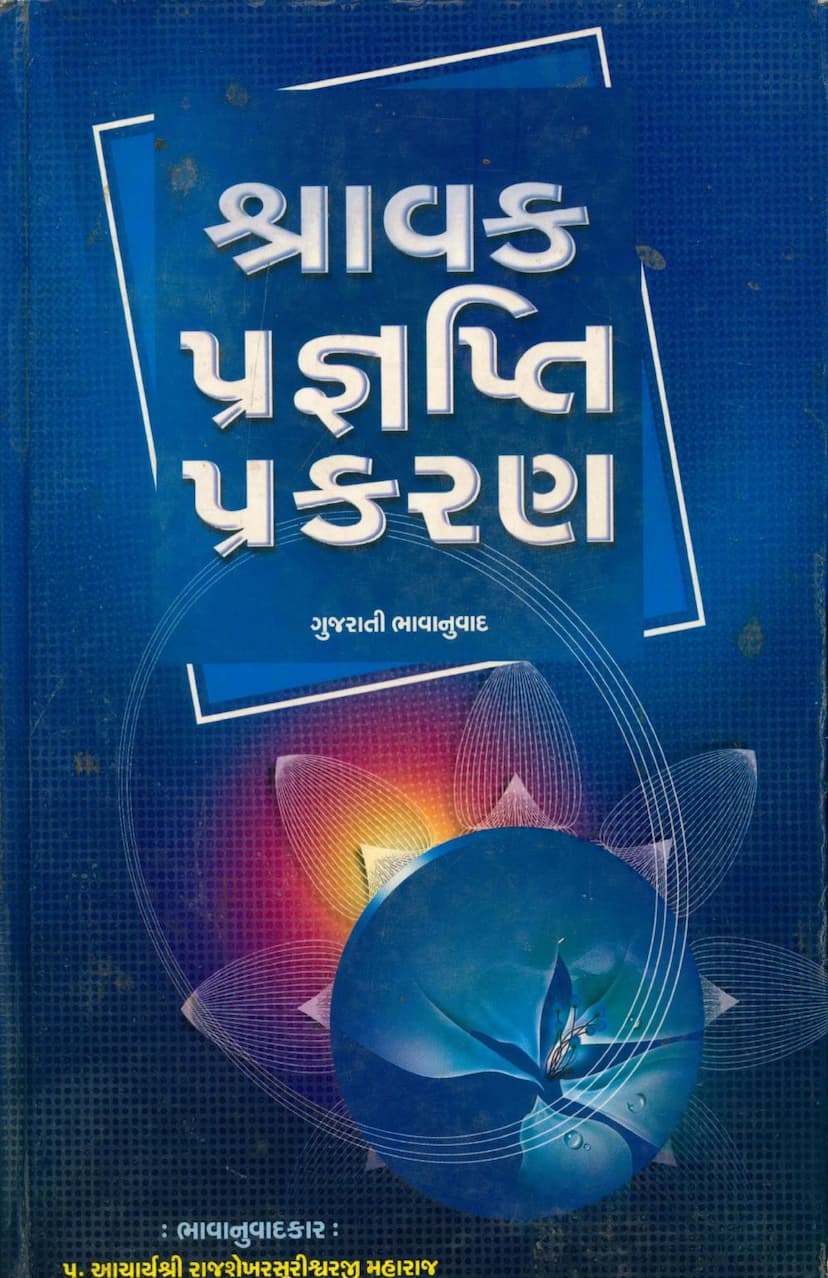Shravak Pragnapti Prakaran
Added to library: September 2, 2025

Summary
The provided text is a Gujarati translation and commentary on the Jain scripture "Shravak Pragnapti Prakaran" by Acharya Rajashekarsuri and Muni Shri Dharmshekharvijay. The book was published by Shri Arihant Aradhak Trust.
Here's a comprehensive summary of the text based on the provided pages:
Book Title: Shravak Pragnapti Prakaran (શ્રાવક પ્રજ્ઞપ્તિ પ્રકરણ) Authors: Acharya Rajashekarsuri (ભાવાનુવાદકાર), Muni Shri Dharmshekharvijay (સંપાદક) Publisher: Shri Arihant Aradhak Trust Core Content: The book is a Gujarati translation and detailed explanation (commentary) of the Shravak Pragnapti Prakaran, which primarily describes the twelve vows of a Shravak (lay follower) in Jainism.
Key Themes and Sections:
-
Authorship and Lineage: The text acknowledges the original author as Vachakvar Shri Umāsvāti Mahārāja and the commentator as Shri Haribhadra Sūriśvarjī Mahārāja. It highlights the lineage of Acharyas involved in the translation and publication, including Acharya Shri Lalityashekhar Surishwarji Maharaj, Acharya Shri Vijay Shri Prem Surishwarji Maharaj, and Acharya Shri Vijay Shri Heersurishwarji Maharaj, with Acharya Shri Rajashekarsuri as the translator and Muni Shri Dharmshekhar Vijayji as the editor.
-
Purpose of the Text: The translation and commentary are intended to help those with limited knowledge of Sanskrit, including monks, nuns, and devout lay followers (Shravaks and Shravikas), to understand the twelve vows of a Shravak in detail. The text also covers various other related subjects as they arise.
-
Structure and Content (Based on the Index): The book is structured into several key sections, covering fundamental Jain principles relevant to lay followers:
- Introduction: Meaning of "Shravak," virtues of listening to Jain teachings, introduction to the twelve vows.
- Sammyaktva (Right Faith): This significant section delves into the nature of right faith, its types (Kshayopashamik, Aupashamik, Kshayik, etc.), and its importance. It also discusses the relationship between the soul (Jiva) and Karma, the causes of Karmic bondage (mithyatva, etc.), the eight types of karma, and their sub-categories (e.g., Jnana-varaniya, Darshana-varaniya, Mohaniya, etc.).
- Seven Tattvas (Realities): A detailed exposition of the seven fundamental realities in Jainism: Jiva (soul), Ajiva (non-soul), Asrava (influx of karma), Bandha (bondage of karma), Samvara (cessation of karma influx), Nirjara (shedding of karma), and Moksha (liberation). It categorizes souls and discusses their states.
- Aticharas (Transgressions) of Right Faith: This section discusses the transgressions of right faith such as doubt (Shanka), desire (Kanksha), fault-finding (Vichikitsa), praise of other sects (Parapakhanda Prashansa), and adherence to other sects (Parapakhanda Samstava).
- Twelve Vows of a Shravak: The core of the text, detailing the five vows of a lay follower (Anuvratas), the three vows of quality (Gunavratas), and the four vows of practice (Shikshavratas). Each vow is explained with its nature, benefits, and transgressions.
- Anuvratas (Minor Vows): Non-violence, truthfulness, non-stealing, celibacy, and non-possession.
- Gunavratas (Vows of Quality): Vows related to directions, enjoyment/use of possessions, and prevention of useless speech.
- Shikshavratas (Vows of Practice): Samayika (equanimity/meditation), Deshavakashika (limited observance of vows), Paushadhopavasa (fasting on specific days), and Atithisamvibhaaga (offering to guests/monks).
- Daily Conduct (Dinacharya) and Travel Conduct (Pravas Vidhi): This section outlines the daily routine and conduct expected of a devout lay follower.
- Samlekhana (Intentional Fasting unto Death): Discussion on the practice of Sallekhana, its conditions, and transgressions.
- Bhavanas (Meditations/Reflections): The spiritual states and reflections that a Shravak should cultivate.
- Debates and Philosophical Arguments: The text engages with various philosophical viewpoints and debates, particularly in sections discussing the nature of karma, bondage, and the validity of vows when faced with potential harm or unintended consequences (e.g., discussions on the consequences of violence, the concept of 'apavada').
-
Commentary and Translation: The text is presented with a Gujarati translation of the original verses, followed by a detailed commentary (Teeka) that explains the meaning, context, and philosophical implications of each verse. The commentary often includes examples, analogies, and scriptural references to clarify the teachings.
-
Specific Points of Interest:
- Karma Theory: A significant portion is dedicated to explaining the complex theory of karma, its types, duration, and how it binds the soul.
- Right Faith (Sammyaktva): The text elaborates on the foundational importance of Right Faith and its various manifestations.
- Vows and Their Transgressions: A detailed breakdown of each vow and the ways it can be transgressed, providing practical guidance for adherence.
- Philosophical Debates: The text addresses potential doubts and counter-arguments, demonstrating a deep understanding of Jain philosophy and its nuances.
Overall Purpose: The "Shravak Pragnapti Prakaran," as presented in this Gujarati translation with commentary, serves as a comprehensive guide for Jain lay followers. It aims to provide a clear and accessible understanding of the principles, practices, and ethical conduct required to live a virtuous and spiritually progressive life, ultimately leading towards liberation (Moksha).